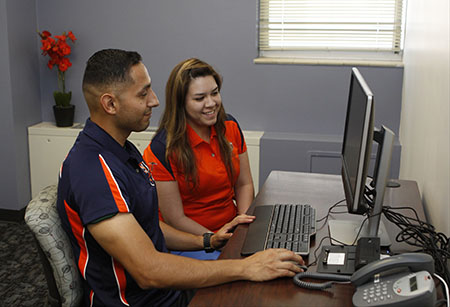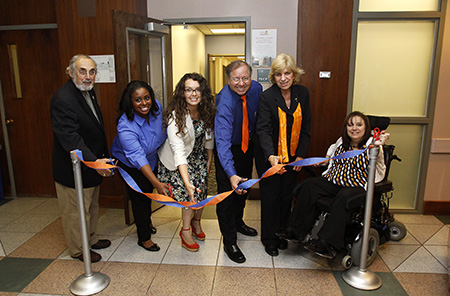By Laura L. Acosta
UTEP News Service
The new Rehabilitation Sciences Clinical Teaching Laboratory at The University of Texas at El Paso will help to increase job opportunities for people with disabilities.
On July 10, the College of Health Sciences hosted the laboratory’s grand opening in UTEP’s Campbell Building. The new clinical teaching facility will offer Community Rehabilitation Program (CRP) services to assist individuals with disabilities to obtain gainful employment and prepare graduate students to become vocational rehabilitation counselors.

UTEP is an approved provider with the Division of Assistive and Rehabilitative Services – Division of Rehabilitation Services (DARS-DRS), a Texas state agency. This partnership enables UTEP’s professional staff and Master of Rehabilitation Counseling (MRC) graduate students, with appropriate supervision, to provide vocational rehabilitation services to clients receiving services from DARS-DRS.
“We are excited to be opening the new Rehabilitation Sciences Clinical Teaching Lab in UTEP’s Campbell Building,” said Kathleen Curtis, Ph.D., dean of the College of Health Sciences. “We will offer Community Rehabilitation Program services, which will serve several purposes – increasing access to vocational rehabilitation counseling for people with disabilities in our community, as well as expanding available training sites for graduate students in the UTEP Master of Rehabilitation Counseling program. There are comparable training facilities in other Texas universities as well as peer institutions in other states.”
Under the direction of Luis A. Aguilera, the Community Rehabilitation Program director, the Rehabilitation Sciences Clinical Teaching Laboratory will provide a full spectrum of services such as job development, placement and coaching, and supported employment services.
“Think about your own process of getting a job,” said Aguilera, a counselor with more than 30 years of experience serving the El Paso community. “You probably had some support from a family member or from a friend or a teacher who helped you along to find your first job. That’s pretty much what we do. Our participants have the skills, the abilities and the potential to be productive citizens, but all they need is just words of encouragement.”
MRC graduate students also will provide Vocational Adjustment Training (VAT), which offers training on soft skills such as self-concept and self-motivation skills, goal setting, problem solving, social skills, money management and conflict resolution. Upon completion, VAT participants will receive a certificate of completion from UTEP.

“We will be teaching participants how to do their résumés, interviewing skills, how to contact employers and do cold calls, schedule information interviews, all of those kinds of things that you and I do whenever we look for work,” Aguilera said.
The U.S. Department of Labor indicates the unemployment rate for people with disabilities is 12.7 percent, which is more than double the unemployment for people without disabilities, which is 5.8 percent.
The lab will work closely with DARS-DRS vocational rehabilitation counselors to follow each participant’s individualized plan for employment.
“We are pleased to continue our growing partnership with UTEP so that we can provide greater opportunities for Texans with disabilities who are seeking employment,” said Deborah Peterson, DARS-DRS area manager. “The new CRP will help our consumers find employment, provide additional training for our Vocational Rehabilitation Counselors, and local employers will gain a quality employee. The new program will provide multiple benefits for our community.”
According to Barbara A. Schoen, Ph.D., director of the Master of Rehabilitation Counseling Program in the College of Health Sciences, the Rehabilitation Sciences Clinical Teaching Lab provides a direct connection between UTEP and the community.
The Community Rehabilitation Program services that the laboratory offers will not only help DARS-DRS clients achieve quality employment, but MRC students also will have the opportunity to gain valuable skills to become competent and effective rehabilitation counselors in the community by working with individuals with disabilities.
“Through this process everyone wins,” Schoen said. “DARS participants get a job, the lab trains future Vocational Rehabilitation Counselors in CRP services, the employers receive a quality employee who is productive and who takes pride in his or her job, and the federal and state governments receive taxes from an individual who is often receiving financial supports (i.e., Supplemental Security Income or Social Security Disability Insurance).”
The laboratory is currently accepting client referrals from DARS. Individuals with disabilities who are interested in receiving employment-based services should contact the Department of Assistive and Rehabilitative Services at www.dars.state.tx.us or 866-581-9328 to be referred to a local office.
The grand opening celebration also highlighted the past, present and future of the Rehabilitation Counseling Program through a Centennial Event that spotlighted top achievements in the field over the past 100 years.